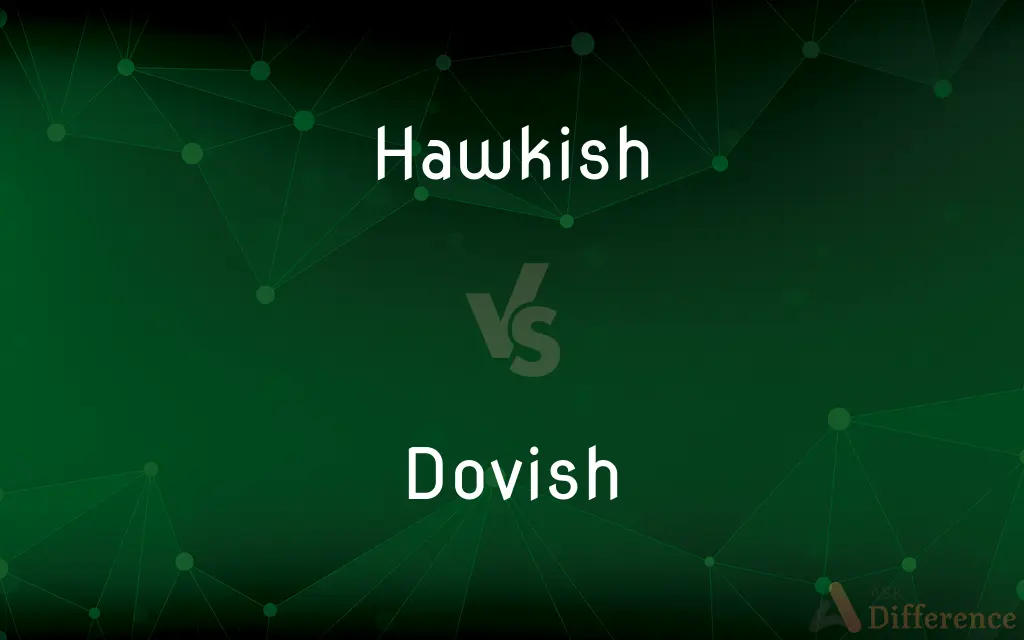Hawkish vs. Dovish — What's the Difference?
By Tayyaba Rehman & Urooj Arif — Updated on March 24, 2024
Hawkish refers to favoring aggressive policies, especially in military and foreign affairs, while dovish denotes a preference for peaceful and diplomatic solutions.

Difference Between Hawkish and Dovish
Table of Contents
ADVERTISEMENT
Key Differences
Hawkish individuals or policies are characterized by their support for military action and a proactive stance in defending national interests, often advocating for the use of force as a means to solve international disputes. On the other hand, dovish attitudes emphasize negotiation, diplomacy, and peaceful resolutions, showing a general aversion to conflict and a preference for dialogue over aggression.
In economic contexts, being hawkish means favoring policies that prevent inflation, even at the risk of slowing economic growth, such as raising interest rates. Dovish, in contrast, implies a preference for policies that stimulate economic growth and employment, even if they risk causing inflation, typically supporting lower interest rates.
Hawkish policymakers are often seen as more willing to take risks and assert a country's power internationally, believing that strength and the willingness to use force deter aggression and secure peace. Dovish figures, however, argue that true security comes from building alliances, understanding, and cooperation, suggesting that aggression often begets more aggression.
The terms also reflect attitudes toward national security. Hawkish individuals advocate for strong defense measures, increased military spending, and readiness to confront threats directly. Conversely, dovish people prioritize spending on social programs over military budgets and seek to address the root causes of conflict, such as poverty and inequality, through non-military means.
Hawkish and dovish stances both play crucial roles in shaping a country's foreign policy and economic strategies, reflecting different philosophies on achieving peace, security, and prosperity. While hawkish strategies may be favored in times of clear threats or aggression, dovish approaches are often sought after to prevent conflicts and foster international collaboration.
ADVERTISEMENT
Comparison Chart
Definition
Favoring aggressive or forceful policies, especially in military.
Preferring peaceful and diplomatic solutions to conflicts.
Economic Policy
Supports policies that prevent inflation, often by raising interest rates.
Favors stimulating economic growth, even at the risk of causing inflation.
National Security
Advocates for strong defense measures and increased military spending.
Prioritizes social programs over military budgets, seeks non-military conflict resolutions.
Risk Tolerance
Willing to take risks to assert power and secure national interests.
Advocates for caution and negotiation to avoid conflict.
Peace Strategy
Believes in deterrence and the use of force to maintain peace.
Suggests that understanding, cooperation, and diplomacy ensure peace.
Compare with Definitions
Hawkish
Advocating for aggressive policies in national defense.
The senator’s hawkish stance called for increased military spending.
Dovish
Prioritizing social spending over military budgets.
The party’s dovish platform included cutting defense spending to fund education.
Hawkish
Supporting tight monetary policies to combat inflation.
The central bank took a hawkish approach to control inflation.
Dovish
Supporting monetary policies that encourage economic growth.
The central bank's dovish policy aimed to lower unemployment.
Hawkish
Prone to taking decisive, often military, action.
The administration's hawkish policies were evident in their quick military response.
Dovish
Preferring diplomatic solutions over conflict.
The diplomat’s dovish approach facilitated a peace agreement.
Hawkish
Favoring the use of force in international relations.
Hawkish leaders pushed for intervention overseas.
Dovish
Advocating for peaceful resolutions in foreign policy.
Dovish leaders called for dialogue instead of retaliation.
Hawkish
Emphasizing strength and readiness to use power.
The candidate's hawkish views appealed to voters concerned about national security.
Dovish
Favoring negotiations and understanding to avoid wars.
The government's dovish stance avoided military engagement.
Hawkish
Resembling a hawk in nature or appearance
His hawkish nose
Dovish
Advocating peaceful or conciliatory policies, especially in foreign affairs
A group of influential young dovish advisors
Hawkish
Advocating an aggressive or warlike policy, especially in foreign affairs
The administration's hawkish stance
Dovish
Any of various widely distributed birds of the family Columbidae, which includes the pigeons, having a small head and a characteristic cooing call.
Hawkish
Any of various birds of prey, especially of the genera Accipiter and Buteo in the family Accipitridae, characteristically having a short hooked bill and strong claws used for seizing.
Dovish
A gentle, innocent person.
Hawkish
Any of various similar birds of prey.
Dovish
A person who advocates peace, conciliation, or negotiation in preference to confrontation or armed conflict.
Hawkish
A person who preys on others; a shark.
Dovish
Pertaining to a dove; dove-like.
Hawkish
One who demonstrates an actively aggressive or combative attitude, as in an argument.
Dovish
(figurative) Peaceful, conciliatory.
Hawkish
A person who favors military force or action in order to carry out foreign policy.
Dovish
Disfavoring increasing interest rates; inclined against increasing interest rates.
The Federal Reserve's statement on recent inflation was interpreted as dovish by the market.
Hawkish
To hunt with trained hawks.
Dovish
Like a dove; harmless; innocent.
Hawkish
To swoop and strike in the manner of a hawk
"It was fun to watch the scattered snail kites ... lifting and falling in the wind as they hawked across the shining grass and water" (Peter Matthiessen).
Dovish
Advocating peace, compromise or conciliation rather than war or conflict. Opposite of hawkish
Hawkish
Resembling a hawk in appearance or behaviour.
Dovish
Opposed to war
Hawkish
Supportive of warlike foreign policy; bellicose; inclined toward military action.
The Prime Minister could count on the support of a hawkish majority in Parliament to support the invasion.
Hawkish
Favouring increasing interest rates; inclined towards increasing interest rates.
The Federal Reserve's recent statement on the slowing of inflation was interpreted as hawkish by the market.
Common Curiosities
What is a dovish economic policy?
A dovish economic policy involves measures that aim to stimulate economic growth and reduce unemployment, often through lower interest rates and expansive monetary policy, even if there's a risk of inflation.
How do dovish policies affect international relations?
Dovish policies, which emphasize diplomacy and peaceful resolution, can lead to improved international relations by fostering trust, cooperation, and dialogue among nations, potentially reducing the likelihood of conflicts.
Can a person be hawkish on defense but dovish on the economy?
Yes, it's possible for someone to be hawkish on defense, supporting strong military measures, while being dovish on the economy, favoring policies that stimulate growth and potentially increase inflation.
What does hawkish mean in politics?
In politics, hawkish refers to a stance that supports aggressive policies, especially in defense and foreign affairs, favoring the use of force or hardline strategies.
Why might a government adopt a hawkish foreign policy?
A government might adopt a hawkish foreign policy to deter aggression, project strength internationally, or respond to perceived threats to national security with assertive actions.
How do central banks use hawkish or dovish policies?
Central banks use hawkish policies, like raising interest rates, to control inflation, and dovish policies, like lowering interest rates, to stimulate economic growth and employment.
How do economic conditions influence hawkish or dovish stances?
Economic conditions, such as inflation rates and unemployment levels, can influence whether policymakers adopt hawkish or dovish stances to address specific economic challenges.
How do geopolitical dynamics affect hawkish and dovish stances?
Geopolitical dynamics, including alliances, rivalries, and regional conflicts, play a crucial role in determining whether a hawkish or dovish stance is more appropriate or likely to succeed.
Do dovish policies always prevent conflicts?
While dovish policies aim to prevent conflicts through diplomacy and understanding, they don't always succeed, as they require mutual willingness to negotiate and sometimes may be perceived as weakness by adversaries.
Can a country’s stance change from hawkish to dovish?
Yes, a country's stance can shift from hawkish to dovish or vice versa, depending on changes in leadership, national priorities, external threats, and the global political climate.
What are the criticisms of hawkish policies?
Critics argue that hawkish policies can lead to unnecessary conflicts, increase military spending at the expense of social programs, and sometimes exacerbate tensions rather than deter threats.
What historical examples illustrate the effectiveness of dovish policies?
Historical examples like the Cold War détente or the Good Friday Agreement illustrate how dovish policies
Is being hawkish good for the economy?
Being hawkish, especially in terms of monetary policy, can be good for controlling inflation, but it might slow economic growth by making borrowing more expensive. The impact is context-dependent.
Are dovish leaders less effective in ensuring national security?
Not necessarily; dovish leaders may prioritize long-term security through alliances, diplomacy, and addressing root causes of conflict, which can be as effective as military measures.
What role do public opinion and media play in shaping hawkish or dovish policies?
Public opinion and media can significantly influence the adoption of hawkish or dovish policies by shaping perceptions of threats, national interests, and the desirability of peace or aggressive actions.
Share Your Discovery

Previous Comparison
Pilipino vs. Filipino
Next Comparison
Survival vs. SurvivorAuthor Spotlight
Written by
Tayyaba RehmanTayyaba Rehman is a distinguished writer, currently serving as a primary contributor to askdifference.com. As a researcher in semantics and etymology, Tayyaba's passion for the complexity of languages and their distinctions has found a perfect home on the platform. Tayyaba delves into the intricacies of language, distinguishing between commonly confused words and phrases, thereby providing clarity for readers worldwide.
Co-written by
Urooj ArifUrooj is a skilled content writer at Ask Difference, known for her exceptional ability to simplify complex topics into engaging and informative content. With a passion for research and a flair for clear, concise writing, she consistently delivers articles that resonate with our diverse audience.















































